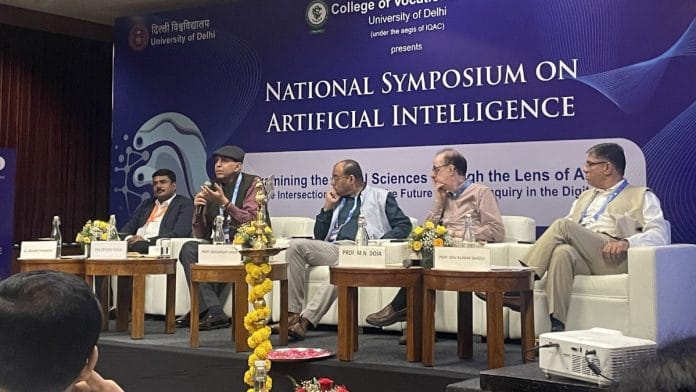New Delhi: Former Delhi University Vice-Chancellor Dinesh Singh called for a return to a “trans-disciplinary” approach, one that works to incorporate AI in every field and then connects diverse areas.
While addressing the National Symposium on Artificial Intelligence: Re-examining the Social Sciences Through the Lens of Artificial Intelligence & IT seminar, he said, “When the British arrived, they told us to separate History from Mathematics, and we believed them. Now, these two disciplines barely cross paths.”
He lamented how rigid academic divisions have become, and India, today, regrets creating the walls.
“But the NEP is urging us, loud and clear, to bring back the trans-disciplinary spirit, and we must, before it’s too late,” the former vice-chancellor added.
The College of Vocational Studies (CVS), University of Delhi, hosted the two-day conference in collaboration with the Indian Council of Social Science Research (ICSSR) at the India Habitat Centre in Lodhi Road on Wednesday and Thursday.
The event’s chief guest, on the opening day, was Professor Dhananjay Singh, Member Secretary, ICSSR, and the audience, a mix of professors and PhD scholars, saw participants from Delhi, Srinagar, and even Uzbekistan.
“My goal with this conference is to shake people and achieve the three As—aware, alert and awake—towards the importance of AI in academics,” Singh told ThePrint.
AI in education
When Professor Gauri Mishra from the Department of English at CVS asked her students to write an assignment on Premchand’s short story Poos Ki Raat, she was surprised to receive two completely different stories. The students, the 60-year-old later realised, didn’t even know which version of the story given by ChatGPT was authentic.
That moment sparked a growing concern about the erosion of academic rigour in the age of AI. It was this concern that led her to attend the conference.
“Are we dumbing down an entire generation? In the age of AI, how do we preserve academic rigour?” Mishra asked.
However, not everyone shares her worry. Singh offered a more optimistic view. In his eyes, AI isn’t a threat; it’s an opportunity. If anything, it will push students to go beyond the surface and aim higher.
With a hint of humour, he said, “Indian students, like students elsewhere, have always been adept at plagiarism. AI is just the latest tool, not a new problem.”
According to him, AI can help redefine education in India by encouraging students to move beyond simple paraphrasing and rote search, and instead explore deeper, more creative uses of AI.
Former education journalist Neha Pushkarna added another layer to the conversation, explaining why students often turn to AI instead of their teachers.
“It never judges,” she said. “Even if you don’t understand a concept after hearing it ten times, AI will explain it the eleventh time, without frustration, without shame.”
She believes the accessibility and non-judgmental nature of AI has been the reason behind the addiction for students. But whether it will truly dull an entire generation, she argues, depends entirely on teachers.
“I want teachers to outpace their students when it comes to mastering AI,” Pushkarna said. “Only then can they set the rules, defining how, when, and to what extent AI should be used.”
While Mishra’s concerns about declining academic standards persist, her perspective on AI has shifted, if only slightly.
“The way Singh spoke about AI making learning playful and enjoyable really stayed with me,” she said. “It inspired me to stop fearing AI and start treating it like a friend.”
Her final takeaway from the event was clear—AI can no longer be ignored. “It has to be embraced. So, we might as well treat it as an ally,” Mishra added.
Also read: ‘Processing the loss’—At Delhi pub, ‘Joi Zubeen da’ chants, 1 am singing
Lessons from the Mahabharata
In his address, Dhananjay highlighted the importance of bridging ‘gyan’—knowledge drawn from the social sciences and ancient Indian traditions—with ‘vigyan’, or modern science. It’s a balance, he noted, that has long been overlooked.
While he acknowledged the impressive capabilities of AI, he was clear about one thing: human judgment remains essential.
“There must be human interference,” the chief guest said, stressing that technology alone cannot define the boundaries of knowledge or truth.
To explain his point, Dhananjay drew from the Mahabharata, referencing a moment when Krishna tells Arjuna, “You should decide what way to give to what I say.”
For Dhananjay, that line captures the crux of man’s relationship with AI; people must choose how much weight to give its voice.
“There’s still a vital role for us to play,” he said. “Cross-checking with primary sources, referencing contemporary studies, engaging with scholars in the field—that’s where we come in. We are not in opposition to AI, but rather participants in shaping its use.”
Among the audience, student Priyanjana Ghosh found particular resonance in the idea that AI shouldn’t be feared, but rather engaged with, explored and experimented with like any other tool.
Still, she remains grounded in her expectations.
“Sure, machine learning can make life easier,” Ghosh said. “But personal intellectual growth matters just as much. People who spend 20 or 25 years immersed in texts and research are not idiots; they do it because there’s value in that human pursuit of knowledge.”
(Edited by Saptak Datta)






